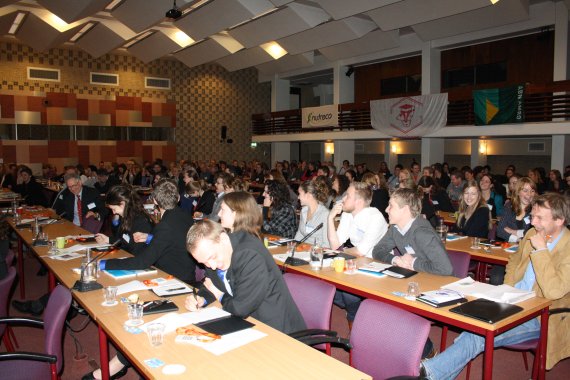Sustainability is the new creed for intensive livestock farming. Livestock farmers have to improve animal welfare, spare the environment and cut down on antibiotics. This needs getting used to, as farmers have for years been focussing exclusively on the cost price of meat. A pork chop is cheaper at present than 25 years ago, although labour, land and animal feed have become more expensive and farmers have to invest in environmental measures. This is a dead-end street, was the concern of many speakers at the symposium. The Veetelers are celebrating their 50 th anniversary. While it was the government who imposed demands on intensive livestock farming in the past, this is now done by supermarkets and animal welfare groups such as Dierenbescherming (Dutch Society for the Protection of Animals) and Wakker Dier. Wyno Zwanenburg, chairman of the Dutch Organisation for Pig Farmers, is pleased since this is the only way by which pig farmers can earn more from their meat. In the past, they had to make agreements with buyers in the meat chain. This development has led to Dierenbescherming, Albert Heijn supermarkets and meat processor Vion introducing the ‘Beter Leven’ (better life) trademark into the market in 2010. Meat is labelled with 1, 2 or 3 stars as animal welfare improves. It’s a very successful concept, says initiator Frank Dales, director of Dierenbescherming. In 2010 and 2011, respectively seven million and 16 million farm animals with this trademark were sold. Since these products have stricter welfare requirements than what the law stipulates, they provide an intermediate segment for consumers willing to pay for animal welfare but find organic meat too expensive. Meanwhile, other supermarkets have followed suit, while Ahold’s next step soon will be to ensure that all the meat sold in its supermarkets have at least 1 welfare star. Vion, supplier of the Beter Leven meat, isn’t just slaughtering more animals, says its spokesperson Marc van der Lee, but also offers intensive livestock farmers four ‘market concepts’. Farmers can supply to the organic, welfare-friendly or traditional market segments by fulfilling various requirements. More animal welfare and less antibiotics will fetch a higher price for each kilogramme. ‘The market is no longer homogeneous,’ says Van der Lee. As such, the market gets its way. However, Zwanenburg, head of the pig farmers’ organization, is still not satisfied. The price which Dutch consumers pay for meat is too low and in turn, very little of this ends up with the livestock farmer. Profits go to the supermarkets, butchers and feed suppliers, while pig farmers on the average have to invest money, he said, quoting the Agricultural Economics Research Institute. Dierenbescherming is very concerned about this. ‘Livestock farmers should supply quality products and be paid accordingly,’ said Dales.
Meat market is no longer homogeneous
Supermarkets and action groups determine the kind of meat we eat nowadays. This issue came up during the symposium organized by study society De Veetelers on 28 February.

